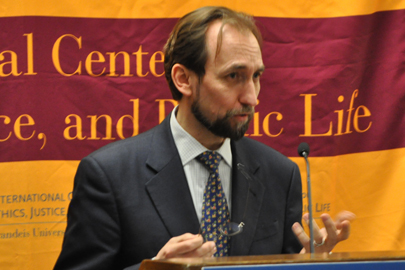Prince of Jordan speaks on future of criminal justice
Ethics Center talk delves into how men and women restore humanity in wake of atrocities
 Photo/Ariana Hajmiragha
Photo/Ariana HajmiraghaPrince Zeid
His Royal Highness Prince Zeid Ra’ad Zeid Al-Hussein of Jordan, the Hashemite Kingdom’s permanent representative to the United Nations, argued in a recent speech at Brandeis that the rule of law is essential to make humanity whole following crimes committed against it, but law is not enough.
Prince Zeid's talk, "Beyond Nuremberg: The Future of International Criminal Justice,” hosted by the International Center for Ethics, Justice and Public Life, delved deeply into the question of how men and women seek to restore their humanity in the wake of genocide and other atrocities.
Prince Zeid’s journey through the sites and the literature of the Holocaust led him to meditate on the question of how survivors – and their extended communities – can become whole again. For Zeid, that process begins with the establishment of the rule of law, and in particular with the extraordinary trials at Nuremberg that for the first time substituted due process for the cycle of revenge.
 |
|
Missed the lecture? |
 |
Zeid spoke of a 2012 visit to the Nuremberg courtroom where young Benjamin Ferencz and other famous prosecutors argued their cases, and of listening there to Thomas Buergenthal, a survivor who went on to become one of the great human rights lawyers and judges of our time. He also spoke of the institutional successors to Nuremberg, especially the International Criminal Court, which represents for him humankind's best hope to end impunity, to stay the hand of revenge, and to honor the memory of the victims of crimes against humanity.
Beyond the formal judicial processes, Prince Zeid addressed the problem of contrition – of why public remorse is so rare, but also of why it is so necessary if victims are to feel that justice has truly been done.
He touched on some of those rare expressions of regret, from Nazi leaders right up to a January 2013 statement of contrition by a Serbian general convicted of crimes against the people of Kosovo. Prince Zeid argued that none of our usual transitional justice mechanisms – international trials, amnesties, truth commissions, or community-based courts – successfully promotes remorse by perpetrators or healing for victims. He insisted rather that, as we undertake the long and essential process of extending the rule of law across the globe, we keep our eyes on other means to address the shortcomings of law itself.
Prince Zeid was introduced by Donald Ferencz, son of prosecutor Benjamin Ferencz and co-founder and executive director of the Planethood Foundation, which generously funded the Distinguished Lecture in International Justice and Human Rights. Ferencz is a passionate advocate of the International Criminal Court and, in particular, of the establishment of the crime of aggression as one of the Court’s core crimes. He is the convener of the Global Institute for the Prevention of Aggression.
Earlier in the day Prince Zeid and Ferencz co-led a lively discussion with students from the Heller School for Social Policy and Management on the history of the crime of aggression and contemporary efforts to extend the jurisdiction of the International Criminal Court to cover it.
Categories: Humanities and Social Sciences, International Affairs





